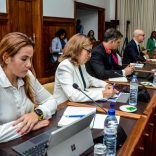Mozambique: IFC pledges to continue funding development projects
Proindicus and MAM, not the government, must pay the debt – PM

The security related companies Proindicus and MAM (Mozambique Asset Management) must do all in their power to restructure their business so that they can comply with their debt servicing obligations, declared Prime Minister Carlos Agostinho do Rosario on Thursday.
Speaking on the second day of a question and answer session between the government and the parliamentary deputies, Rosario insisted that the primary responsibility for the debts lies with the two companies, and not with the government, which is merely the guarantor. It was up to Proindicus and MAM to renegotiate with their creditors.
Proindicus, MAM and a third company, Ematum (Mozambique Tuna Company), took out loans for over two billion dollars in 2013-14 from European banks (mainly Credit Suisse and VTB of Russia). The previous government, headed by President Armando Guebuza, illicitly guaranteed the loans.
As a parliamentary commission of inquiry found last year, the government guarantees violated the Mozambican Constitution (since only parliament, which was kept completely in the dark, can approve such debts). The guarantees also violated the ceilings on guarantees stipulated in the 2013 and 2014 budget laws.
Unlike the bonds issued under the Ematum loan, which were converted into government bonds in 2016, the Proindicus and MAM loans have not been converted into sovereign debt, contrary to claims by opposition parties, which read the inclusion of the guarantees in the General State Account (CGE) as somehow “legalizing” the debts.
“Conversion or not into sovereign debt will follow the norms included in the respective contracts after the possibilities of payment by the companies have been exhausted and in conformity with what may be determined by the Attorney-General’s Office”, said Rosario.
“That is why we say that registering the two guarantees in the CGE does not change their nature, but merely registers them in the public accounts”, stressed the Prime Minister.
Although they should have figured in the 2013 and 2014 accounts, the guarantees were still being hidden from the public in those last years of the Guebuza government, and so they were included late, in the 2015 CGE.
The 2015 CGE was debated and approved by the Assembly in April, with the rebel movement Renamo and the second opposition party, the Mozambique Democratic Movement (MDM) claiming that it was unconstitutional even to mention them in the CGE. Both opposition parties now say they are lodging a request with the Constitutional Council, the highest body in matters of constitutional law, to declare the 2015 CGE unconstitutional.
Rosario told the Assembly that the CGE ought to reflect all transactions that could produce any alteration in state assets. The only reason the government included the two guarantees in the CGE, he said, was “to allow control and monitoring by the Administrative Tribunal, bearing in mind that all acts that affect the public finances should be registered in the General State Account”.
This registration, he added, in no way affected the international independent audit into Ematum, Proindicus and MAM that is currently under way. In the light of the audit report (due to be delivered by the company Kroll Associates by 12 May) the Attorney-General’s Office “must decide on subsequent actions that it may deem necessary in defence of the interests of the state”.
In other words, in Rosario’s view, the CGE changes nothing, and transactions or guarantees that were illicit at the time do not suddenly become legal merely because they are registered in the CGE.












Leave a Reply
Be the First to Comment!
You must be logged in to post a comment.
You must be logged in to post a comment.